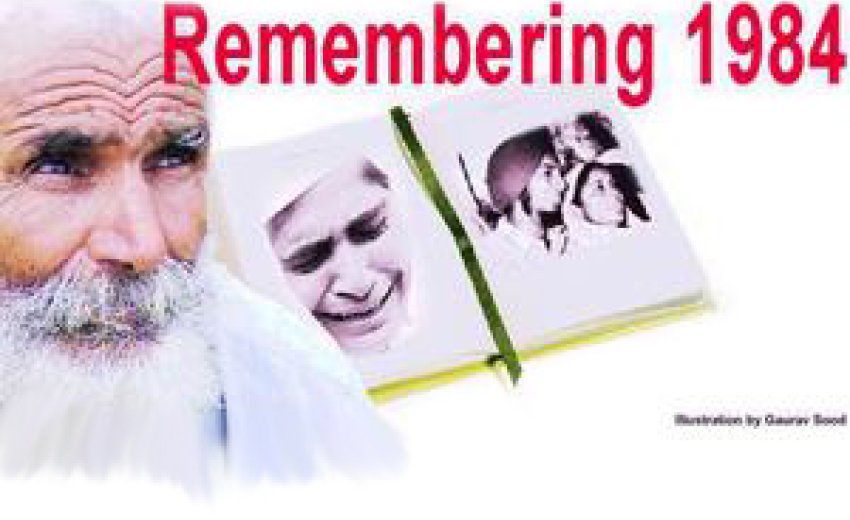
“In Delhi alone more than 3000 Sikhs were burnt alive in the most
gruesome manner. With the Delhi Police playing a most shameful passive
role.”
-- Ved Marwah, former Delhi Police Commissioner, Director General of the National Security Guard, and Governor of Manipur, Mizoram, and Jharkhand.
On October 31, 1984, Indira Gandhi was assassinated. It was announced
to the world that her Sikh bodyguards were the perpetrators of the
crime; soon after, the killings, rapes, and looting began, not ending
until three days later. On November 9, Rajiv Gandhi, then Prime
Minister of India, addressed a rally at the Boat Club, famously
commenting on the violence, death, and rape in the Indian capital with
the casual remark, “When a big tree falls, the earth shakes.”
Interestingly enough, when Mahatma Gandhi was assassinated by a
Maharashtrian Hindu, the earth didn’t tremble for all Maharashtrian
Hindus. In fact, when Rajiv Gandhi himself was killed, there were no
riots breaking out against Hindu Tamils either.
In Delhi, for nearly three days following the assassination, organized
and systematic killings of Sikhs took place. Numerous government
initiated commissions have noted the role of Congress (ruling party)
politicians, and the police in passively allowing the killings and rapes
to take place and even actively encouraging them. Those who led the
mobs often had lists of ration card holders, enabling them to seek out
Sikh households to subject to terror.
In spite of appeals made to the Prime Minister and the Home Minister,
the army was not called in to stop the pogroms for three days, at which
point the Home Minister, Narsimha Rao, famously noted: “Now it is
enough.” BBC Reporters Mark Tully and Satish Jacob note that, while Rao
and Gandhi allowed for three days of killing, burning, raping, and
looting Sikhs to pass before calling in the army, they made sure to call
the army into Punjab. This was, of course, out of concern that Sikhs
may react violently against Hindus in retaliation for the killing of
Sikhs by Hindu mobs in Delhi. As it turned out, nothing of the sort
took place in Punjab.
O.P. Dwivedi, a Delhi Additional District and Session Judge wrote in
judgement of one of the few convictions of the pogroms, “This genocide
would not have been possible but for the inaction and connivance of the
police.... Police did not try to prevent arson or murders, nor were they
willing to take any action against the guilty.”
Article 2 of the United Nations Convention on the Prevention and
Punishment of the Crime of Genocide, defines genocide as any act
committed with the intent to destroy in whole or in part, a national,
ethnical, racial or religious group by, inter alia, killing or causing
serious bodily or mental harm to the members of the group.
During the pogroms, mobs were found to have been supplied with voters
lists, indicating where Sikhs lived, along with tires, kerosene, and
weapons used to burn, beat, maim and kill Sikhs. Politicians were seen
encouraging the violence if not participating in it themselves. Manoj
Mitta, senior editor of the times of India, and author of the book “When
a Tree Shook Delhi,” notes that the police actually stopped Sikhs from
defending themselves, confiscated their weapons, and returned them to
the mobs. Some Sikhs were even charged with assault as they defended
their families from arsonists.
Rahul Bedi, journalist for the Indian Express, writes in the book “The
Assassination & After,” “The engineered Holocaust needed at least a
day to get organised. And there is enough evidence available to
indicate complicity in the overall plot, complicity of the Congress – I,
complicity of the police, and complicity of the local administrators.”
Interestingly enough, despite all this evidence, there are many who balk
at the idea of admitting that the violence of November 1984 constitutes
genocide. The Indian judiciary, noted journalists and academics, and
many others (non Sikhs) readily admit to this. It seems that those who
refuse to, are those who are afraid of letting the world see India for
what it really is – an egregious offender of human rights. Sikhs are
not alone in their plight. Christians, Muslims, and many others have
suffered and continue to suffer from human rights abuses in India. In
2002, near identical pogroms took place against Muslims in the Indian
state of Gujarat, with all the telltale signs of genocide. Though the
number of casualties was lower in number, it remains a stark reminder of
India’s record on human rights.
Let me be clear: as a proud Canadian, I realize that economic growth is
an important part of our country’s future – of which India is and should
be an integral part. I am in no way suggesting that Canada rethink its
plans to conduct business with India. But as Canadians, we should also
remember that we have a proud history of standing up for human rights –
even when it may not be particularly palatable to our business partners.
Anything less would simply be, well, un-Canadian.
Jagtaran Singh is currently a law student at McGill University, and serves on the board of directors of the Darfur-Sudan Peace Network. He can be reached at [email protected]
